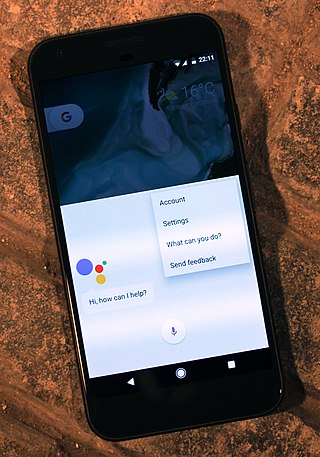AI is artificial intelligence, intellectual ability in machines and robots.

In the industrial design field of human–computer interaction, a user interface (UI) is the space where interactions between humans and machines occur. The goal of this interaction is to allow effective operation and control of the machine from the human end, while the machine simultaneously feeds back information that aids the operators' decision-making process. Examples of this broad concept of user interfaces include the interactive aspects of computer operating systems, hand tools, heavy machinery operator controls and process controls. The design considerations applicable when creating user interfaces are related to, or involve such disciplines as, ergonomics and psychology.

Artificial insemination is the deliberate introduction of sperm into a female's cervix or uterine cavity for the purpose of achieving a pregnancy through in vivo fertilization by means other than sexual intercourse. It is a fertility treatment for humans, and is common practice in animal breeding, including dairy cattle and pigs.
Insemination is the introduction of sperm into a female’s reproductive system for the purpose of impregnating, also called fertilizing, the female for sexual reproduction. The sperm is introduced into the uterus of a mammal or the oviduct of an oviparous (egg-laying) animal. In mammals, insemination normally occurs during sexual intercourse or copulation, but insemination can take place in other ways, such as by artificial insemination.

A sperm bank, semen bank, or cryobank is a facility or enterprise which purchases, stores and sells human semen. The semen is produced and sold by men who are known as sperm donors. The sperm is purchased by or for other persons for the purpose of achieving a pregnancy or pregnancies other than by a sexual partner. Sperm sold by a sperm donor is known as donor sperm.

Ben Shneiderman is an American computer scientist, a Distinguished University Professor in the University of Maryland Department of Computer Science, which is part of the University of Maryland College of Computer, Mathematical, and Natural Sciences at the University of Maryland, College Park, and the founding director (1983-2000) of the University of Maryland Human-Computer Interaction Lab. He conducted fundamental research in the field of human–computer interaction, developing new ideas, methods, and tools such as the direct manipulation interface, and his eight rules of design.
Dr. SbaitsoSBAY-tsoh is an artificial intelligence speech synthesis program released late in 1991 by Creative Labs in Singapore for MS DOS-based personal computers. The name is an acronym for "SoundBlaster Artificial Intelligence Text-to-Speech Organizer".

In computing, ambient intelligence (AmI) refers to electronic environments that are sensitive and responsive to the presence of people. Ambient intelligence was a projection on the future of consumer electronics, telecommunications and computing that was originally developed in the late 1990s by Eli Zelkha and his team at Palo Alto Ventures for the time frame 2010–2020. Ambient intelligence would allow devices to work in concert to support people in carrying out their everyday life activities, tasks and rituals in an intuitive way using information and intelligence that is hidden in the network connecting these devices. As these devices grew smaller, more connected and more integrated into our environment, the technological framework behind them would disappear into our surroundings until only the user interface remains perceivable by users.
Sperm washing is the process in which individual sperms are separated from the semen. Washed sperm is used in artificial insemination using the intrauterine insemination (IUI) technique and in in vitro fertilization (IVF). It may also be used to decrease the risk of HIV transmission by an HIV-positive male, in which case the washed sperm is injected into a female using an artificial insemination technique.
In artificial intelligence, an embodied agent, also sometimes referred to as an interface agent, is an intelligent agent that interacts with the environment through a physical body within that environment. Agents that are represented graphically with a body, for example a human or a cartoon animal, are also called embodied agents, although they have only virtual, not physical, embodiment. A branch of artificial intelligence focuses on empowering such agents to interact autonomously with human beings and the environment. Mobile robots are one example of physically embodied agents; Ananova and Microsoft Agent are examples of graphically embodied agents. Embodied conversational agents are embodied agents that are capable of engaging in conversation with one another and with humans employing the same verbal and nonverbal means that humans do.

Intelligence amplification (IA) refers to the effective use of information technology in augmenting human intelligence. The idea was first proposed in the 1950s and 1960s by cybernetics and early computer pioneers.

Fertility clinics are medical clinics that assist couples, and sometimes individuals, who want to become parents but for medical reasons have been unable to achieve this goal via the natural course. Clinics apply a number of diagnosis tests and sometimes very advanced medical treatments to achieve conceptions and pregnancies.

An intelligent virtual assistant (IVA) or intelligent personal assistant (IPA) is a software agent that can perform tasks or services for an individual based on commands or questions. The term "chatbot" is sometimes used to refer to virtual assistants generally or specifically accessed by online chat. In some cases, online chat programs are exclusively for entertainment purposes. Some virtual assistants are able to interpret human speech and respond via synthesized voices. Users can ask their assistants questions, control home automation devices and media playback via voice, and manage other basic tasks such as email, to-do lists, and calendars with verbal commands. A similar concept, however with differences, lays under the dialogue systems.
A conception device is a medical device which is used to assist in the achievement of a pregnancy, often, but not always, by means other than sexual intercourse. This article deals exclusively with conception devices for human reproduction.
Sperm donation is the provision by a man of his sperm with the intention that it be used in the artificial insemination or other 'fertility treatment' of a woman or women who are not his sexual partners in order that they may become pregnant by him. Where pregnancies go to full term, the sperm donor will be the biological father of every baby born from his donations.
In computing, a natural user interface (NUI) or natural interface is a user interface that is effectively invisible, and remains invisible as the user continuously learns increasingly complex interactions. The word "natural" is used because most computer interfaces use artificial control devices whose operation has to be learned. Examples include voice assistants, such as Alexa and Siri, touch and multitouch interactions on today's mobile phones and tablets, but also touch interfaces invisibly integrated into the textiles furnitures.

A pedagogical agent is a concept borrowed from computer science and artificial intelligence and applied to education, usually as part of an intelligent tutoring system (ITS). It is a simulated human-like interface between the learner and the content, in an educational environment. A pedagogical agent is designed to model the type of interactions between a student and another person. Mabanza and de Wet define it as "a character enacted by a computer that interacts with the user in a socially engaging manner". A pedagogical agent can be assigned different roles in the learning environment, such as tutor or co-learner, depending on the desired purpose of the agent. "A tutor agent plays the role of a teacher, while a co-learner agent plays the role of a learning companion".
An intelligent user interface is a user interface (UI) that involves some aspect of artificial intelligence. There are many modern examples of IUIs, the most famous being the Microsoft Office Assistant, whose most recognizable agentive representation was called "Clippy".

ACM SIGAI is the Association for Computing Machinery's Special Interest Group on Artificial Intelligence (AI), an interdisciplinary group of academic and industrial researchers, practitioners, software developers, end users, and students who work together to promote and support the growth and application of AI principles and techniques throughout computing. SIGAI is one of the oldest special interest groups in the ACM. SIGAI, previously called SIGART, started in 1966, publishing the SIGART Newsletter that later became the SIGART Bulletin and Intelligence Magazine.
Virtual assistants are software technology that assist users complete various tasks. Well known virtual assistants include Amazon Alexa, and Siri, produced by Apple. Other companies, such as Google and Microsoft, also have virtual assistants. There are privacy issues concerning what information can go to the third party corporations that operate virtual assistants and how this data can potentially be used.








